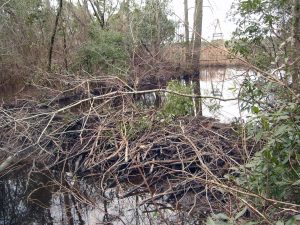UNC researchers receive grant to study potential benefits of beaver dams
November 1, 2020
Researchers from the University of North Carolina at Chapel Hill recently received a grant to study the relationship between beaver dams and water quality. The grant, which is funded by the National Science Foundation, totals nearly $600,000. The Institute’s individual portion totals over $100,000.
The project, which is a collaboration with researchers from Georgia State University, the University of North Carolina at Charlotte and Georgia Gwinnett College, will rely on fieldwork and drones. UNC principal investigator Diego Riveros-Iregui, an associate professor of geography, will be leading the fieldwork portion. His team hypothesizes that beaver dams improve water quality in urban streams.
 Photo credit:
Photo credit:North Carolina Wildlife Resources Commission
Beavers are often considered a nuisance species and subsequently removed from various areas. Nevertheless, beaver dams may remove pollutants from streams and slow down nutrient runoff, Riveros-Iregui said. The project will attempt to determine whether beaver dams are cleaning streams more efficiently than human-engineered stormwater retention structures
“We invest millions of dollars in managing urban water and finding ways to improve water quality in urban settings, but it could be that beavers offer a viable solution to water quality in urban environments,” Riveros-Iregui said. “They’re already doing the work that we want with retention ponds, for example. Beavers are slowing down the water, they’re facilitating the exchange of chemicals between the water and surrounding soils, so by doing that, water has a chance to become cleaner.”
The drone portion of the project, led by the Institute’s Associate Director Susan Cohen, will allow researchers to map stream morphology in relation to the landscape. Drones will also be used to quantify the extent and volume of beaver dams, the connectivity of ponds and streams, and the density of vegetation.
Riveros-Iregui and his students will conduct landscape analysis, instrument installation, and periodic monitoring. They also will collect water samples about every two weeks and analyze their chemical composition to determine the relationship between water quality and beaver dams.
Riveros-Iregui said the project’s largest societal impact will be helping communities improve the way in which dams are managed. A doctoral student and several undergraduate students will also play a significant role in the project while receiving critical training.
The project’s collaborative nature will promote diversity in geosciences since GSU and GGC primarily serve minority students. The project also has a strong outreach component that will increase societal awareness of urban beaver dams. Researchers will work with the Museum of Life and Science in Durham and the Ellerbe Creek Watershed Association (ECWA).
“The students that will be working on this project will be spending time at the museum, interacting with the public, showing them how to collect water samples, explaining their research to the general public, and using the infrastructure that the museum already offers,” Riveros-Iregui said. “Students will be working with the public, translating their science into useful information for the public.”
Riveros-Iregui said he chose these two sites after discussing them with his colleagues, including those at the collaborating institutions. He already had a working relationship with the museum and knew scientists at the ECWA.
“We are the northernmost collaborators on this project. Our other collaborators are down in Charlotte and Atlanta. We first thought of Durham,” Riveros-Iregui said. “We live in an environment where we transition quickly from rural to urban, and where forested urban watersheds offer a good habitat for beaver.”
Riveros-Iregui, who studied geology as an undergraduate, said his interest in earth science led him to focus on rocks and the earth’s sub-surface, but later pursued hydrology, studying surface water. He has since narrowed in on the subfield of ecohydrology, which focuses on the relationship between water and life.
Riveros-Iregui said his main focus is performing research, but he enjoys teaching and working with UNC-Chapel Hill’s undergraduates, who he describes as incredibly smart and talented.
He enjoys communicating his scientific knowledge by interacting with them and makes sure to inform students of opportunities outside of the classroom – such as the beaver dam project. Riveros-Iregui received last year UNC-Chapel Hill’s J. Carlyle Sitterson Award for Teaching First-Year Students.
Riveros-Iregui is currently the principal investigator of UNC’s Carbonshed Lab, where he studies the coupling of carbon and water cycles. He has been involved in hydrology research projects at multiple sites – including the Andes Mountains of Ecuador, the Galapagos, and Jordan Lake.
Story by Ellie Heffernan
Ellie Heffernan is a junior at UNC majoring in journalism and environmental studies. During her time at UNC, she has written for The Daily Tar Heel, volunteered with Musical Empowerment as a teacher and leadership team member, and been a part of the Service and Leadership Residential Learning Program.
